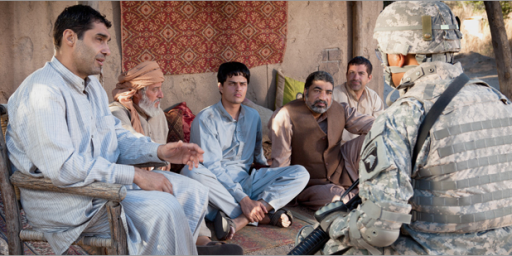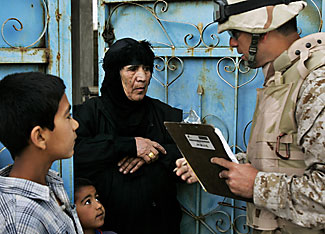Military Discharged 26 Gay Arab and Farsi Translators
The military discharged twenty Arab translators and six Farsi speakers who announced they were gay, according to a new report.
Report: More gay linguists discharged than first thought – U.S. Security (AP)
The number of Arabic linguists discharged from the military for violating its “don’t ask, don’t tell†policy is higher than previously reported, according to records obtained by a research group. The group contends the records show that the military — at a time when it and U.S. intelligence agencies don’t have enough Arabic speakers — is putting its anti-gay stance ahead of national security. Between 1998 and 2004, the military discharged 20 Arabic and six Farsi speakers, according to Department of Defense data obtained by the Center for the Study of Sexual Minorities in the Military under a Freedom of Information Act request.
While the loss of 26 people with these critical language skills over the course of six years is not exactly catastrophic, it does seem unwise. Certainly, the military needs all the Middle Eastern language translators it can get.
Still, the way the story is presented is rather muddled. For one thing, “a research group” hardly seems the most straightforward way to describe a gay rights activist organization.
For another, the idea that the burden for this falls on the shoulders of “the military” is misleading. Federal law, notably the Uniform Code of Military Justice and the Executive Order implementing the “Don’t Ask, Don’t Tell” policy, are the impetus for this. Additionally, it seems rather clear that the translators in question have some culpability as well, as one can discover by reading between the lines much later in the article:
But others, like Elaine Donnelly of the Center for Military Readiness, a conservative advocacy group that opposes gays serving in the military, said the discharged linguists never should have been accepted at the elite Defense Language Institute in Monterey in the first place. “Resources unfortunately were used to train young people who were not eligible to be in the military,†she said.
In the fiscal year ended Sept. 30, 543 Arabic linguists and 166 Farsi linguists graduated from their 63-week courses, according to a DLI spokesman. That was up from 377 and 139, respectively, in the previous year. Experts have identified the shortage of Arabic linguists as contributing to the government̢۪s failure to thwart the Sept. 11 attacks. The independent Sept. 11 commission made similar conclusions.
Ian Finkenbinder, an Army Arabic linguist who graduated from the Defense Language Institute in 2002, was discharged from the military last month after announcing to his superiors that he’s gay. Finkenbinder, who said his close friends in the Army already knew he was gay, served eight months in Iraq and was about to return for a second tour when he made the revelation official. “I looked at myself and said, ‘Are you willing to go to war with an institution that won’t recognize that you have the right to live as you want to?,â€Ã¢€™ said Finkenbinder, 22, who now lives in Baltimore. “It just got to be tiresome to deal with that — to constantly have such a significant part of your life under scrutiny.â€
From this we see two things. First, the 26 people in question joined the military knowing full well what the policy was. Then, they announced that they were homosexual, forcing the military to discharge them. Indeed, in the case of Finkenbinder (and I suspect many of the others) it was a conscious decision to get thrown out of the service rather than go to war.
All that said, the policy makes little sense. This is especially true when, as noted here recently, some of the combatant commands have decided to selectively enforce it during wartime. Jim Henley has much, much more on this angle.
via Andrew Sullivan






Let me play devil’s advocate here:
Islam is, if anything, even more anti-gay than Christianity. Would gay translators alienate the Arab/Farsi speakers they worked with? If that’s a reasonable fear, then can the military reasonably discriminate on that basis?
(Assuming of course that these guys aren’t just sitting in an office translating news items and intercepted signals.)
Some cultures have a different idea of what’s gay. If you have a wife(s) and kids, whatever else you get up to may not be judged harshly. If you ask me, Osama looks a little languid as he drapes himself on those couches.
Odo, who for the record is not gay by any culture’s definition (in fact, that photo up there makes me strangely attracted to the ACLU) … not that there’s anything wrong with that.
While technically true, that implementation throws a very wide latitude of enforcement back at the military. Now, if someone flatly announces to their CO “I’m gay” (which, as you say, raises the suspicion of shirking), the requirements are pretty clear for discharge. But if someone isn’t actively trying to get out of the military, the level to which a commander can willfully ignore such things is pretty high.
And I do have to agree with James that 26 people over 6 years, even in as small a field as Arabic/Farsi cryptolinguistics doesn’t sound like a huge issue – I think the real news story is how people in some fields have an easier time playing the ‘gay card’ to get out than other areas… I wonder how many Infantry or MP types the Army has discharged for gayness in the same period…
These people are scum and should be subject to a good-ol-fashioned hanging like they do Iran. That’ll teach these atheist Farsi lovers a lesson or two!
Although I’ve been retired from the Navy for over ten years, I’m pretty sure that the security clearance regulations still prohibit homosexuals from being cleared for the levels required for cryptolinguists. So for those folks, at least, whether they’re discharged or not, they’re not allowed to work as cryptolinguists if they’re discovered to be homosexuals.
Can they re-hired by DoD as civilian consultants?
What is missing here is context. Yes, the 26 were discharged for being “gay.” However, as a DLI graduate, I can tell you that many young soldiers who are there for up to a year and a half get sick of the military look for ways to get out. Because the wide-body program is hard for some to achieve, the “I’m gay” strategy works well. I’d be really interrested to track down the 26 and see how many are still “gay” now that they are out.
Expanding on my previous post I’m sure the FBI, CIA, Homeland Security etc., could use their talents. Would they excluded from such employment? The GWOT includes law enforcement and para-military aspects as well conventional and non-conventional military operations.
I’ve noticed the same thing, Homer. I recall a shipmate who reenlisted, got the bonus (which, at the time (about 25 years ago) was paid as a lump sum) shortly after he arrived at DLI for Intermediate Arabic, and within a week, “discovered” that he was gay.
Since he was booted on the government’s action rather through his own misconduct (since he certainly hadn’t “acted” on his supposed gayness), he walked out of the Navy about $20,000 richer than he would have if he just hadn’t reenlisted (which is what he originally wanted to do).